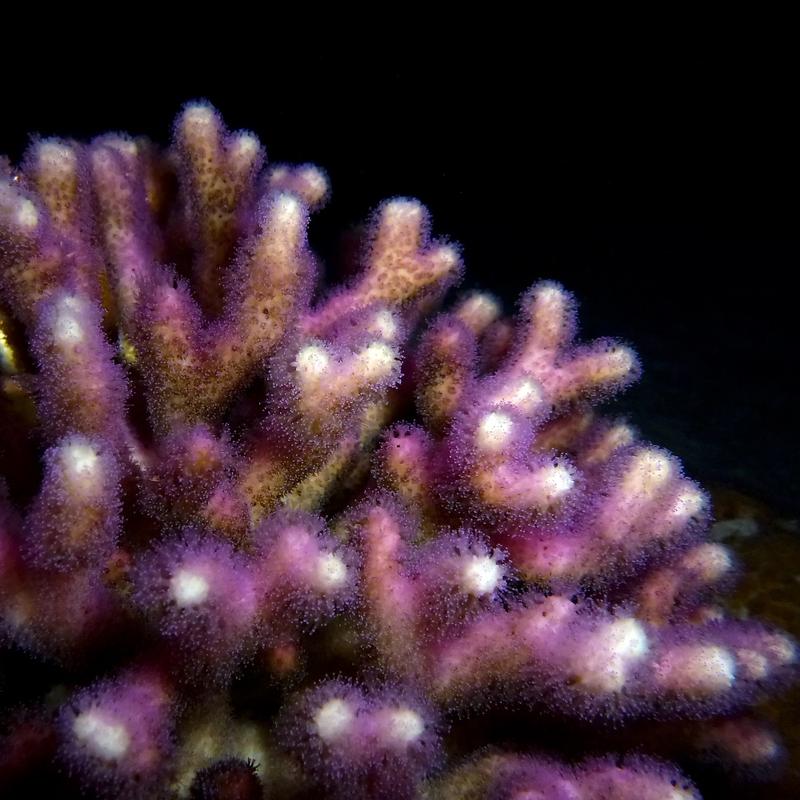

One of the investigated coral colonies (species: Stylophora pistillata) with erected polyp tentacles at night
Foto: Dr. Ulisse Cardini
A team of international researchers led by Prof. Dr. Christian Wild from University of Bremen’s faculty of Biology & Chemistry recently made the following surprising discovery: It transpires that the conversion of nitrogen, or nitrogen fixation, by micro-organisms that are associated with corals clearly in turn supports the conversion of carbon, or carbon fixation, by the micro-algae in the coral tissue. This is one of the main findings of the Bremen study that has now been published in the renowned journal “Proceedings of the Royal Society”.
Coral Holobiont
Although corals are animals, so-called cnidarians, they host such a lot of micro-algae and other micro-organisms like bacteria in their tissue that they develop their own micro-ecosystems and are classified as holobionts. With the aid of their tiny co-inhabitants, coral holobionts are capable of carrying out processes thoroughly untypical of animals.
Carbon fixation by means of the photosynthesis of micro-algae is especially important for the productivity of corals: What happens is that carbon dioxide is converted into organic material with the aid of light energy. Thanks to this process, corals are able to grow at extremely fast rates, creating not only new habitats, but also nourishment for other organisms. Coral holobionts carry out carbon fixation with extraordinary intensity – and they do this although they dispose of almost no nitrogen with which to produce biomass.
How does the paradox come about?
Could parallel processes, especially nitrogen fixation by bacteria and carbon fixation by micro-algae, possibly be playing a role here? This is the unorthodox hypothesis that has engaged the attention of Bremen marine researcher Professor Christian Wild for a very long time.
Funded by the German Research Foundation, he and his team of PhD students – in particular the Italian early-career researcher and lead author of the study, Ulisse Cardini – and other colleagues set out to research the interrelation between carbon and nitrogen fixation by corals.
The team examined these processes in all the dominant hard corals found on a coral reef in the northern region of the Red Sea in Jordan. They carried out their research during several lengthy expeditions in all four seasons of the year 2013. They chose this location for their research because of its high seasonality: That is the pronounced natural fluctuation in nutrient concentrations contained in the water across the seasons.
Somewhat to their surprise, they discovered that carbon fixation was highly constant for all corals throughout the whole year. This was true even in the summer months when nutrient concentrations are especially low. The key to answering this puzzle, they found, clearly lies in the process of nitrogen fixation by micro-organisms that inhabit the coral. The large number of measurements they took showed that in summer this process was about tenfold more intense than at other times of the year.
A major finding of the study is that the process of nitrogen fixation by micro-organisms compensates for the extreme nitrogen limitation of the summer months. Thus, processes by bacteria support the processes by micro-algae in the coral tissue so that in the end there is a beneficial effect not only for the coral but also for the whole reef. The study showed that corals are good examples of animals, humans included, where beneficial internal microbes fulfill roles important for the health of the host organisms.
The article by Cardini et al. breaks new scientific ground in several respects. It is now clear how the individual processes carried out by the different coral inhabitants are intertwined. And it furthermore reveals that the important role micro-organisms play in these interrelations has until now been underestimated. The international research team around University of Bremen Professor Christian Wild and his research associate Dr. Ulisse Cardini have delivered an important new explanation for the Darwinian reef paradox.
You can obtain more information on this topic by contacting:
University of Bremen
Faculty Biology / Chemistry
Marine Ecology
Prof. Dr. Christian Wild
Phone. 0421 218 63387
e-mail: christian.wild@uni-bremen.de
Dr. Ulisse Cardini
Division of Microbial Ecology
Department of Microbiology and Ecosystem Science
Research Network “Chemistry meets Microbiology”
University of Vienna, Althanstr. 14, 1090 Vienna (AT)
www.microbial-ecology.net
www.ulissecardini.info
Telefon: +43 677 61633148
E-mail: cardini@microbial-ecology.net












